Winds of Vengeance (Crimson Worlds Refugees Book 4) Read online
Page 6
Frasier looked back, silent for a moment.
Harmon shook his head. “Enough of that…we have too much to deal with to slip into recollection and regret. And the situation is dramatically different now from what the admiral faced. Our arms have not seen a shot fired in anger in more than two decades, not since the last of the First Imperium forces were destroyed. We are alone, with no contacts, no enemies, unless we make them from among our own people. If I refuse to call an election, if I even appear to seize power, it will enrage them all. It would be the spark that ignites civil war.”
“Sir…”
“Connor, your loyalty speaks well of you…and it has been one of the pillars on which I’ve supported my burdens all these years. But I believe you may not have thought past honor and steadfastness. We must also consider reality. Would you want to receive an order to bring your Marines into the streets? To open fire on the people? Would you obey such a command? Or would giving it finally cost me your allegiance?”
“I will do whatever is necessary, sir.” The words came out almost as a reflex, but Harmon could detect the doubt there. Frasier would never turn on him…but he knew the Marine was a man of honor, one who would struggle mightily with an order like that.
“And will your Marines? What if the Tanks rise up? How many of your Marines are clones? Half? No, it’s more than half, isn’t it?”
“The Marines will follow their orders, sir. Always.”
“Will they? I can think of some Marines who disobeyed unconscionable orders. Elias Holm and Erik Cain to name two. Would your Marines feel it dishonorable to follow such examples?” It was a low blow, Harmon knew. Holm and Cain were epic heroes of the Corps, larger than life Marines that still inspired their descendants.
“Generals Holm and Cain faced different circumstances, sir.”
“Do you think Erik Cain would have ordered his Marines to fire on his own people if he had been a Tank?” Harmon could see Frasier was getting upset. He was backing the Marine into a corner, trying to force him to admit there were limits to what commands he would honor. But there was no point to it. Max Harmon had no intention of putting himself in a position to issue such orders. He didn’t know if Compton would have—the admiral had been a stronger man, he believed that with certainty, but he wasn’t sure which way that would have pushed him. But Max Harmon was not going to be the man to order his forces to kill his fellow citizens.
“Never mind, Connor. It doesn’t matter. I’ve already made my decision. I’m calling an election in six months. That gives me half a year to make my case, to desperately try to heal some of the rifts and put together a workable coalition.”
“And if you fail, sir? What then?”
Harmon sighed. “Well, my friend…in that case you will be taking orders from someone else.”
* * *
“There are rumors Harmon is going to call for a new election. It is time. We must rally our support and make our move…and secure the purity of our species for all time.” Jacques Diennes stood in the dimly lit room, talking to a small group. The restaurant out front was a profitable business, but its primary purpose was as a cover. The Human Society wasn’t an illegal enterprise…at least it hadn’t yet taken any direct action against the government. But Diennes had instilled a sense of secrecy among the higher echelons of the group.
“I agree, Jacques. It is not only time…it is perhaps our last chance to secure our aims, at least through peaceful means. The naturally-born humans on Earth Two are still a majority, but if the limits on quickenings are loosened, we could find ourselves outnumbered in a few years.” Emi Kahn looked across the small room at the Society’s leader. The two were both Pilgrims, but the Society had considerable support among the Earth Two born NBs as well. Indeed, they had greater participation among the younger element of society than those who had served on the fleet. “We cannot allow that to happen.”
Kahn been one of Diennes’ earliest followers, and the two had worked feverishly to secure the Prohibition, the law forbidding the creation of any more Mules. The Society considered the mixing of human and alien DNA to be an outrage, an immoral act that had to be stopped. And they had seen it done.
The Society had long sought to ban the quickening of more Tanks as well, though with far less success. They had helped to pass the laws setting annual limits, but amid the well-recognized need to populate the republic, they’d failed to garner enough support for an outright ban.
The Society’s positions weren’t based on religion, at least not any designated, establish belief structure, but its members were committed to the notion that there was a special spark in humanity, one that couldn’t be replicated in a laboratory. It considered the Tanks second-class citizens, devoid of the essence that made humans complete.
Though some of its political rivals cast the Society as dark and dangerous, its goals had never included any hostile actions against the Tanks, nor even active discrimination against those already existing. It just demanded that no new Tanks be quickened, and that they be allowed to naturally die out. The Society’s position on the naturally-born children of the Tanks was still a matter of debate within the organization, with some considering the offspring tainted by their origins and others looking at them as the same as any other NBs.
The Mules were another matter entirely. The Society looked upon them as dangerous abominations, and called for them to be confined and observed at all times…or worse.
“So, you will launch your campaign now? You will seek the presidency?”
The excitement in Kahn’s voice was unmistakable, and Diennes understood the source of it. For years the Society had used its minority seats in the Assembly to pursue its goals, wheeled and dealed with the other factions to gain a victory here or there. But now they were ready to reach for the power, to take control over Earth Two. The presidency was a powerful office. For whatever reasons, Max Harmon had failed to truly utilize its true powers…a mistake President Diennes would not repeat.
He looked right at Kahn and smiled. “Yes, Emi…it is time. We will announce the campaign tomorrow.”
* * *
“The second squad is deviating from optimal positioning by seven percent.”
Lieutenant Devon Fortis-Cameron stood, watching the Marines of his platoon run through the simulation. He didn’t hear the AI’s words, not audibly, at least. The probe inside his armor was connected to a small implant on his neck, providing a direct connection between the artificial intelligence running his fighting suit and his own cerebral cortex. It wasn’t quite like a thought either, it was something completely different. It was a two-way communications node, but Cameron usually answered the computer presence audibly. It was creepy enough knowing the thing had direct access to his brain, and while he knew speaking didn’t do anything to change that fact, it made him feel better somehow anyway.
“Sergeant Hearns…your people are lagging. Pay attention, and get them in place now. If someone was actually shooting at you, you’d probably all be scragged by now.”
“Yes, sir.”
Cameron was still getting used to the ‘sir’ stuff. His commission was barely a month old, and he was definitely still adapting to being responsible for forty-nine other Marines. He looked out over the valley—his people were scattered over a simulated front line almost eight kilometers long. He had them all on his scanner, but he could only see the second squad. The rest were on the other side of a low ridge. He was about to tell the AI to switch his visor to one of the drone inputs, but the computer acted on his thought before he could get the words out.
Useful…but so creepy…
He looked out over the forces beyond the ridge, the view from one of his recon drones moving over the simulated battlefield. The squads beyond the ridgeline were in perfect position, within one or two percent of optimal performance.
Second squad’s minor sloppiness notwithstanding, his platoon had performed well, very well indeed. They were looking good to finish in the top five percent, p
erhaps even higher. And that was cause for a rookie platoon commander to be satisfied.
Like all Tanks, Cameron’s first name had been assigned to him at birth, though he’d never been able to get a clear answer on how the selection process worked.
Probably an AI with a random number sequencer and a database of baby names…
Also like the rest of the Tanks, he carried two last names. The first was the surname of his sire, the individual who contributed the genetic material for his quickening. Gabriel Fortis had been a decorated officer, and ranked in the top fifty of the male members of the fleet in the genetic testing that had preceded the selection of donors for the first round of quickenings.
It had been all the rage among the Tanks over the past few years to seek out their DNA sponsors. Cameron knew a dozen others who had done it, and he was far from sure it was a good idea. It wasn’t like finding a lost parent…the DNA sponsor was an exact replica genetically, like a twin, but older. He imagined such connections could be difficult, especially on the donor, who might find dozens of closes seeking him or her out.
That wasn’t an issue for Cameron and his crèche-mates. Gabriel Fortis had survived the journey to Earth Two, but he’d been killed less than six months after his clones were quickened. It had been a routine attack by remnant First Imperium forces, a squadron that had escaped the Regent’s destruct order. The fleet had been ready, and some of the new planetary defenses were functional as well. The First Imperium force had been easily destroyed, eighteen ships blown to atoms…with only a dozen human casualties. But one of those had been Gabriel Fortis, killed instantly when a structural support crashed to the deck and almost crushed him.
Cameron had never been sure how he felt about that. He regretted the loss of one of his fellow humans, a man who had died in the line of duty, protecting the nascent republic. But he’d never been able to decide if he felt more than that, some kind of connection, a feeling of loss for the closest thing he had to a parent. It was something he still wrestled with in his more pensive moments.
He’d chosen the second surname himself, on the day he had left the campus on his sixteenth birthday, fully educated and legally an adult. He’d still been a civilian then, unsure of whether he intended to pursue a military career, but he nevertheless selected the name of a Marine who had died almost fifty years before, in the legendary battle known as the Slaughter Pen.
Kyle Cameron had been a Marine too, and a comrade of the legendary Erik Cain. Cameron couldn’t explain why he’d chosen that namesake over any other, except to note that the story of the original Cameron’s death had resonated with him, how the Marine had stayed behind and held off an enemy platoon with his heavy weapon while the rest of his squad withdrew.
Many of the Tanks had taken the names of famous warriors. There were Cains, Holms, Garrets, Prestons…just about every celebrated hero of both the Corps and the navy. But Cameron had been drawn to the less renowned hero, feeling he was righting a wrong, giving a courageous Marine the overdue recognition he had long deserved.
There had been one hundred Fortis clones in that first group, and the last time he’d checked there were ninety-one remaining. Seven had experienced various degrees of replicative failure, and they’d been terminated in the crèche. One had been killed in a military training accident. And one had died of the Plague.
He still remembered when he first read the entry on the library computer. Evan Fortis-Jackson, an engineer. That had been almost nine years before. The Tanks enjoyed a greatly enhanced immunity to most of the diseases that preyed upon the NBs. They rarely suffered from cancer, heart disease, even the drug-resistant pathogens that had become a moderate danger to their naturally born cousins. For almost twenty years, as the first group of Tanks grew to adulthood and beyond, it was widely believed the cloning process had been successful in screening out harmful susceptibilities.
Then the first Tank got sick. Not just ailing, not seriously afflicted, but horribly, painfully ill. The Plague had come. Its first victim lasted three days after onset, writhing in indescribable pain the entire time as the cells of his body simply withered and died. Medical science was stumped. Even the Mules, using the medical knowledge of the First Imperium, had been helpless to treat the disease, or even provide effective palliative care.
Then it struck again. And again. At first, there was fear a deadly epidemic was sweeping through the nascent republic. The Regent had deployed an engineered pathogen against its enemies millennia before, and a public panic almost resulted, a widespread terror that the ancient disease had returned in some mutated form. But then it became apparent that only the Tanks were affected. And despite the efforts of the greatest medical and scientific minds in the republic, every attempt to cure or prevent the disease ended in failure.
It was a genetic abnormality, that much the researchers had surmised, some kind of malfunction in the cloning process, one that was not detectable before outbreak. Some donor DNA was more susceptible, that became clear as more cases developed. Cameron was fortunate. His own Fortis DNA had exhibited one of the lowest incidence rates of all the genetic lines, with just one case so far out of one hundred specimens. The average was much higher, almost five percent…and one DNA line, the Larsons, had lost sixteen of the ninety-four of their number who had survived quickening.
“Second squad’s positioning is back within mission parameters.”
Cameron nodded as the AI’s report pulled him from his rambling thoughts. Nodding was a pointless gesture, he knew, but instinctive nonetheless. He couldn’t imagine commanding in the field without the sophisticated computer personality assisting him…but he wondered sometimes if people had become too dependent on technology. Knowing the AI was watching everything, that he could access all its input and analyses directly in his mind, even as he did his own memories…was it too much? Could it help but degrade attentiveness?
And encourage wandering minds thinking of names and training and the Plague…
He didn’t have an answer…and the AI that was privy to his thoughts didn’t offer one. His training had also included some time with an old-style AI unit, the kind the Marines on the fleet used, before First Imperium technology moved human computer technology hundreds of years into the future in an instant. The Marines back then had given their primitive units names, but that practice had fallen out of favor. A Marine thirty years before would speak to his AI, identifying it by name, to activate it or to make clear he was speaking to the unit and not, say, another Marine on the com. But that wasn’t necessary anymore…even when Cameron spoke to the AI, the unit was integrated fully with his brain. It knew he was speaking to it before the words came out, even as he formulated what he was going to say.
The bond between a modern Marine and his AI was far closer than it had been in the days of the fleet. Most Marines came to think of the machines as extensions of themselves, some voice from the back of their mind helping them keep track of things. And it felt weird to give part of yourself a name.
He turned to the side, his suit almost anticipating the movement, the AI acting on his thought impulses, precisely controlling the elaborate servo-mechanicals to make the move seem almost completely natural. Cameron remembered when he’d first arrived to begin training. There had been weapons and suits of armor waiting, old models, the one the Marines on the fleet had worn into battle.
Cameron and his fellow trainees got the chance to try out the old-style fighting suits, and he had gained an appreciation for the older officers and instructors, men and women from the fleet who had worn the almost medieval suits in battle. Cameron could still remember wincing as more than a dozen needles and probes sliced into him, and the feeling of barely being able to walk in the hulking, clumsy armor was as fresh in his mind as it had been that day. He wondered how the Marines of the fleet had endured it. He’d asked one of his instructors at training camp, but the only reply he’d gotten was that Marines did whatever had to be done.
And it was the only reply he need
ed. Some things had changed. AIs, armor, weapons. But some things remained, as true now as they had been then, and years before that, beyond the Barrier, when the Corps had fought its great wars before the coming of the First Imperium.
Marines did whatever had to be done.
Chapter Six
Report from Unit 3A6502 to Vengeance One
All units continue to pursue enemy communications drones. Seven destroyed as of this transmission. Estimate 2-3 more have escaped our initial search area. Enemy stealth technology is nearly a match for our own. This is making the detection of the final units difficult.
Analysis suggests we cannot rely upon one hundred percent interception. The original plan for a multi-year systematic sweep of nearby systems may be compromised by the possibility the enemy vessel’s warning will reach their home world. I must therefore develop a secondary strategy…one designed to intercept and destroy any rescue or retaliatory force the enemy may send after their scout vessel.
Cutter Research Compound (Home of the Mules)
Ten Kilometers West of Victory City, Earth Two
Earth Two Date 10.30.30
“How were you able to complete this so quickly, Achilles? And in secret.” Peleus stared at the underground chamber that stretched almost out of sight in the dimly lit gloom.
“Do you recall the ‘delay’ we encountered delivering the new prototype worker robots about three months ago?”
Peleus smiled. “You faked that?” He looked out over the massive room and then back to Achilles. “My compliments, my friend. Even I was fooled.”
“I would have told you, but I thought it was best to maintain maximum secrecy.” Achilles smiled. The extreme automation of the Mules’ massive research and production facility had made it relatively easy to hide his activities from the others. Only Callisto had known he had diverted the new robots to his own purposes.

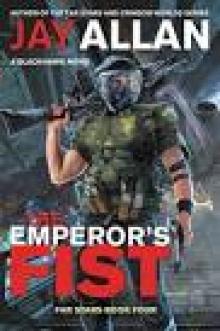 The Emperor's Fist
The Emperor's Fist Blood on the Stars Collection 1
Blood on the Stars Collection 1 Attack Plan Alpha (Blood on the Stars Book 16)
Attack Plan Alpha (Blood on the Stars Book 16)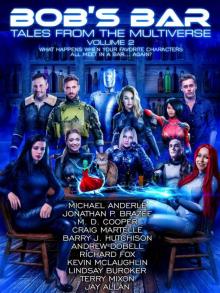 BOB's Bar (Tales From The Multiverse Book 2)
BOB's Bar (Tales From The Multiverse Book 2) The Others
The Others Nightfall
Nightfall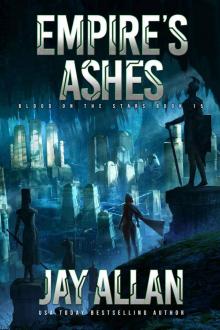 Empire's Ashes (Blood on the Stars Book 15)
Empire's Ashes (Blood on the Stars Book 15)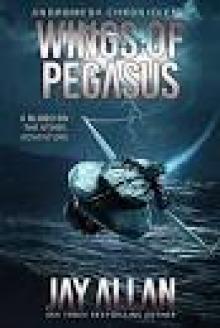 Wings of Pegasus
Wings of Pegasus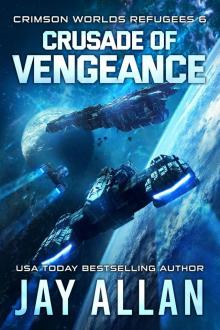 Crusade of Vengeance
Crusade of Vengeance The Last Stand
The Last Stand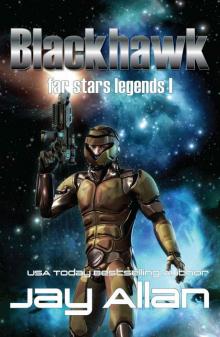 Blackhawk: Far Stars Legends I
Blackhawk: Far Stars Legends I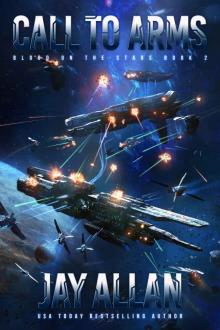 Call to Arms: Blood on the Stars II
Call to Arms: Blood on the Stars II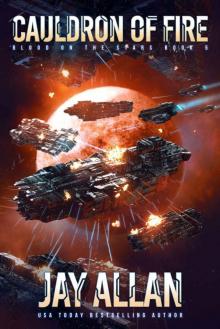 Cauldron of Fire (Blood on the Stars Book 5)
Cauldron of Fire (Blood on the Stars Book 5) Revenge of the Ancients: Crimson Worlds Refugees III
Revenge of the Ancients: Crimson Worlds Refugees III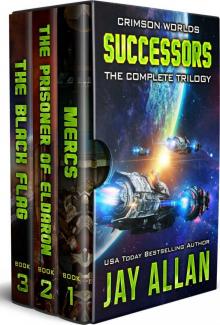 Crimson Worlds Successors: The Complete Trilogy
Crimson Worlds Successors: The Complete Trilogy The Grand Alliance
The Grand Alliance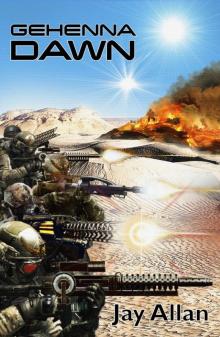 Portal Wars 1: Gehenna Dawn
Portal Wars 1: Gehenna Dawn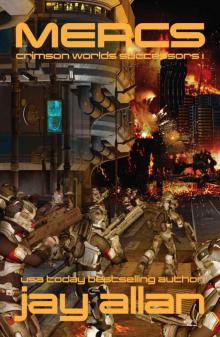 MERCS: Crimson Worlds Successors
MERCS: Crimson Worlds Successors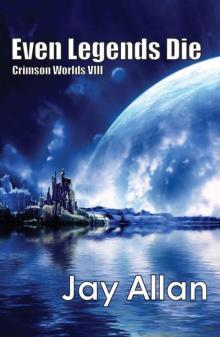 Crimson Worlds: 08 - Even Legends Die
Crimson Worlds: 08 - Even Legends Die Winds of Vengeance
Winds of Vengeance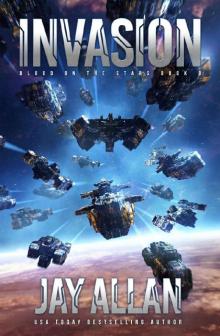 Invasion (Blood on the Stars Book 9)
Invasion (Blood on the Stars Book 9) A Little Rebellion (Crimson Worlds III)
A Little Rebellion (Crimson Worlds III)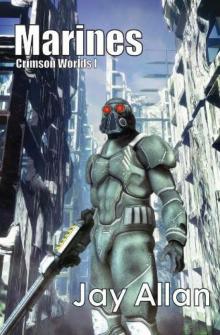 Marines
Marines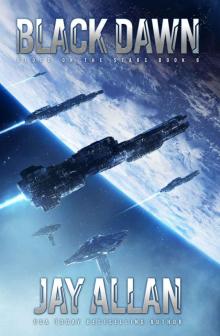 Black Dawn (Blood on the Stars Book 8)
Black Dawn (Blood on the Stars Book 8)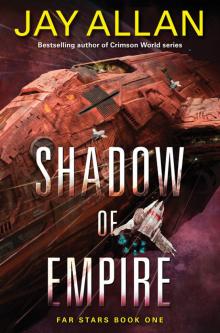 Shadow of Empire
Shadow of Empire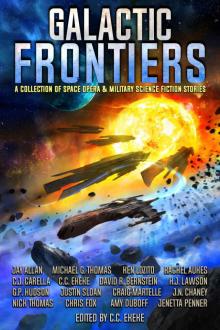 Galactic Frontiers: A Collection of Space Opera and Military Science Fiction Stories
Galactic Frontiers: A Collection of Space Opera and Military Science Fiction Stories Winds of Vengeance (Crimson Worlds Refugees Book 4)
Winds of Vengeance (Crimson Worlds Refugees Book 4)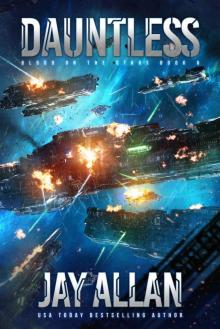 Dauntless (Blood on the Stars Book 6)
Dauntless (Blood on the Stars Book 6) Portal Wars: The Trilogy
Portal Wars: The Trilogy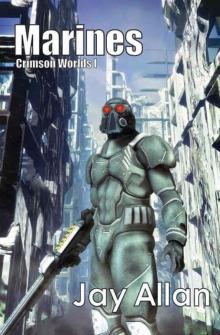 Marines cw-1
Marines cw-1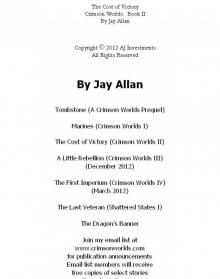 The Cost of Victory
The Cost of Victory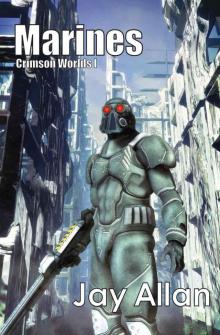 Marines (Crimson Worlds)
Marines (Crimson Worlds)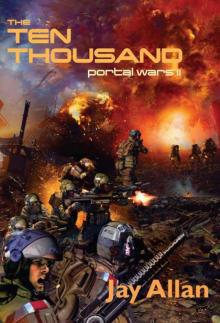 The Ten Thousand: Portal Wars II
The Ten Thousand: Portal Wars II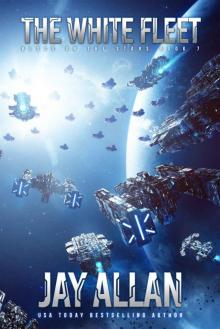 The White Fleet (Blood on the Stars Book 7)
The White Fleet (Blood on the Stars Book 7) Crimson Worlds Collection III
Crimson Worlds Collection III The Black Flag (Crimson Worlds Successors Book 3)
The Black Flag (Crimson Worlds Successors Book 3) Tombstone
Tombstone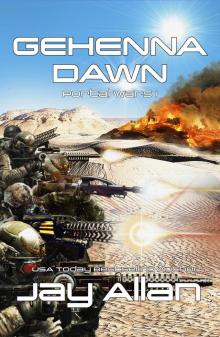 Gehenna Dawn
Gehenna Dawn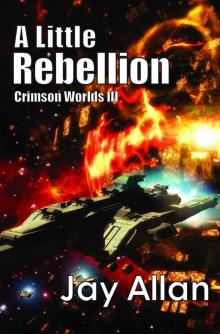 A Little Rebellion (Crimson Worlds)
A Little Rebellion (Crimson Worlds)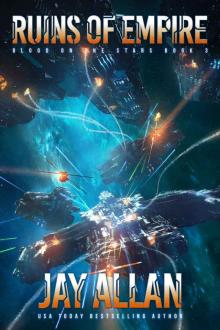 Ruins of Empire: Blood on the Stars III
Ruins of Empire: Blood on the Stars III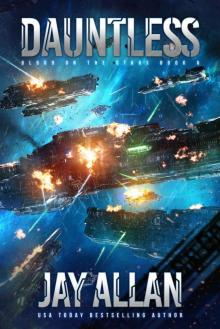 Dauntless
Dauntless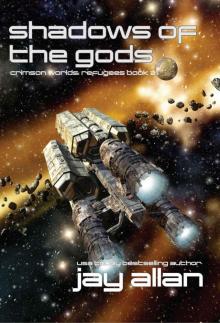 Shadows of the Gods: Crimson Worlds Refugees II
Shadows of the Gods: Crimson Worlds Refugees II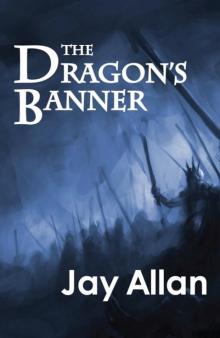 The Dragon's Banner
The Dragon's Banner Echoes of Glory (Blood on the Stars Book 4)
Echoes of Glory (Blood on the Stars Book 4)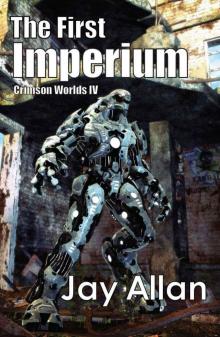 Crimson Worlds: 04 - The First Imperium
Crimson Worlds: 04 - The First Imperium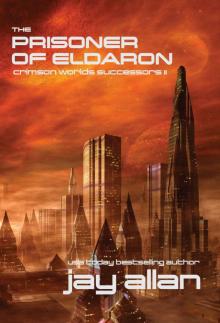 The Prisoner of Eldaron: Crimson Worlds Successors II
The Prisoner of Eldaron: Crimson Worlds Successors II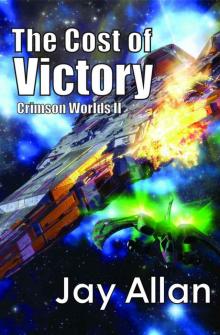 The Cost of Victory (Crimson Worlds)
The Cost of Victory (Crimson Worlds)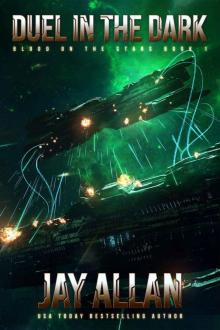 Duel in the Dark: Blood on the Stars I
Duel in the Dark: Blood on the Stars I Into the Darkness: Crimson Worlds Refugees I
Into the Darkness: Crimson Worlds Refugees I Crimson Worlds Refugees: The First Trilogy
Crimson Worlds Refugees: The First Trilogy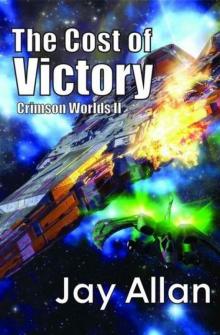 The Cost of Victory cw-2
The Cost of Victory cw-2 Stars & Empire 2: 10 More Galactic Tales (Stars & Empire Box Set Collection)
Stars & Empire 2: 10 More Galactic Tales (Stars & Empire Box Set Collection) Flames of Rebellion
Flames of Rebellion Stars & Empire: 10 Galactic Tales
Stars & Empire: 10 Galactic Tales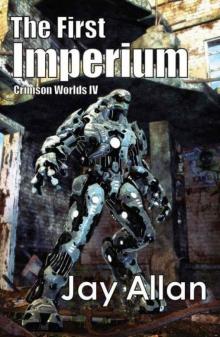 The First Imperium cw-4
The First Imperium cw-4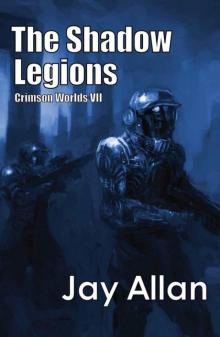 Crimson Worlds: 07 - The Shadow Legions
Crimson Worlds: 07 - The Shadow Legions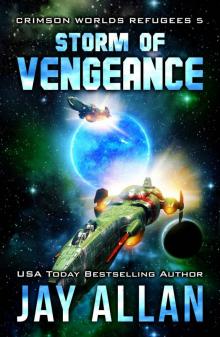 Storm of Vengeance
Storm of Vengeance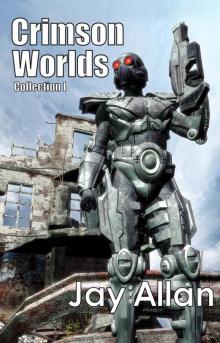 Crimson Worlds Collection I
Crimson Worlds Collection I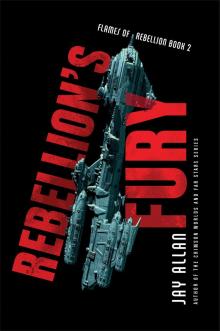 Rebellion's Fury
Rebellion's Fury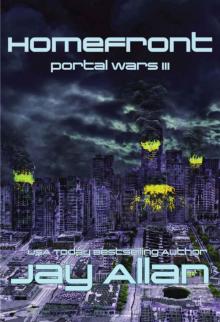 Homefront: Portal Wars III
Homefront: Portal Wars III Tombstone (crimson worlds)
Tombstone (crimson worlds) Crimson Worlds: Prequel - Bitter Glory
Crimson Worlds: Prequel - Bitter Glory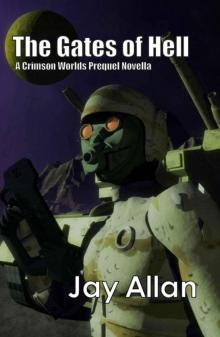 Crimson Worlds: Prequel - The Gates of Hell
Crimson Worlds: Prequel - The Gates of Hell The Fall: Crimson Worlds IX
The Fall: Crimson Worlds IX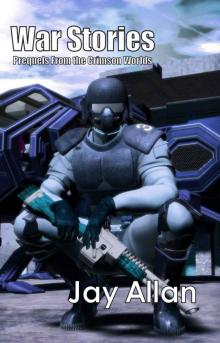 Crimson Worlds: War Stories: 3 Crimson Worlds Prequel Novellas
Crimson Worlds: War Stories: 3 Crimson Worlds Prequel Novellas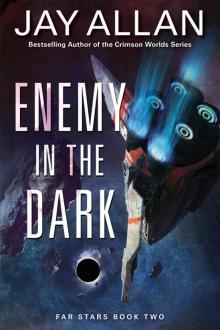 Enemy in the Dark
Enemy in the Dark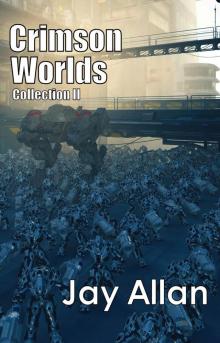 Crimson Worlds Collection II
Crimson Worlds Collection II